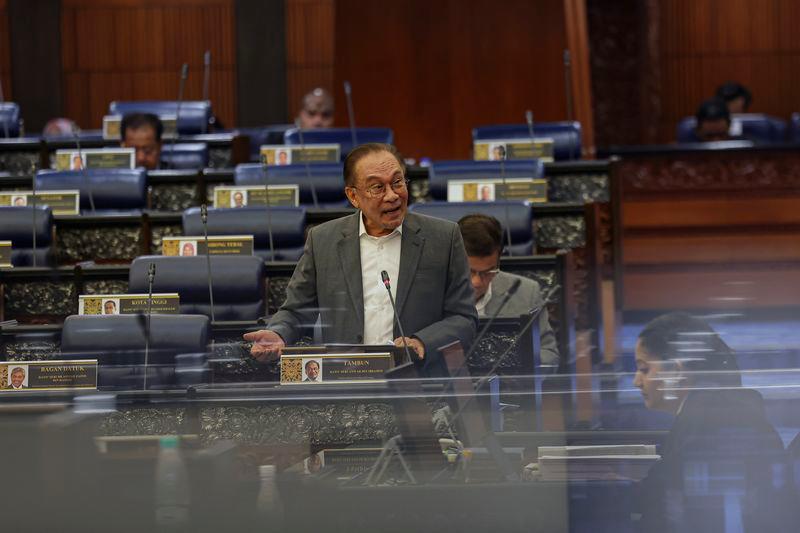KUALA LUMPUR: Prime Minister Datuk Seri Anwar Ibrahim emphasised that the government’s approach to addressing hardcore poverty is inclusive and non-discriminatory, ensuring that all citizens in need, regardless of race, receive assistance.
While acknowledging that the majority of the poor people in the country are among the Malay and Bumiputera communities, he insisted that all races including Chinese and Indians who are affected will be helped.
“It is true the majority are Malays, but a significant portion of the poorest are from the Indian community. For instance, in Kuala Lumpur, the majority is Malay but the Indian community is large and compared to the number, the population is high.
“When addressing hardcore poverty, we do not do so based on race. Therefore, we will address the needs of all the poor, including the small number in the Chinese community and the larger number in the Indian community,“ he said during the Minister’s Question Time in the Dewan Rakyat today.
He said the notion that efforts to eradicate poverty are solely focused on Malays is not true.
While the majority of those in need may be Malays due to their larger population, the policy is designed to support all poor citizens, said the prime minister and encouraged anyone who hears statements contradicting the policy to report them, as they are not aligned with the government’s stance.
ALSO READ: Poverty eradication remains a key agenda of gov’t
The prime minister was responding to a supplementary question from S. Kesavan (PH-Sungai Siput) regarding addressing hardcore poverty and the implementation of initiatives to eradicate poverty to cover all races, including the Indian community.
In response to an original question from Datuk Siti Zailah Mohd Yusoff (PN-Rantau Panjang) regarding the government’s efforts to eradicate hardcore poverty, Anwar said that as of Jan 31 last year, a total of 126,372 household heads were under the hardcore poor category and the issue was resolved by July 29 this year.
“However, we are aware that the number has increased, as the success of this initiative has led to new registrations. By July 29, we had resolved the initial cases, and on Aug 1, we reopened for new requests, including older ones that felt the need to apply again. This amounts to 22,893.
“As of Oct 21 this year, 15,029 household heads or 65.6 per cent of the hardcore poor cases have been resolved, and we will continue to work on addressing the remaining cases,“ he said.
The Prime Minister said the cooperation between federal and state government agencies has contributed to the increase in new registrations for the hardcore poor, thus facilitating the government’s efforts to lift them out of poverty.
Regarding the mechanism used, Anwar, who is also the Minister of Finance said the government has shifted from using household income to per capita income as a more accurate way to assess the actual earnings of the people.
“We have revised the previous government’s approach to using per capita income based on new information, including from the Cost of Living Council, as well as dialogues and engagement sessions with state governments.
“This is not a perfect approach, but based on the figures provided, we have completed our goals for the first year. An additional 22,000 cases are nearly resolved, and I am confident they can be completed,” he said.
In response to a supplementary question from Syed Saddiq Syed Abdul Rahman (MUDA-Muar) regarding the threshold for individual income levels that qualify for cash assistance, Anwar said the matter would be reviewed, taking into account the rising cost of living.
“Regarding the proposal to set the income threshold, we will examine new proposals and consider the need to increase the threshold based on living cost,“ he said.
Syed Saddiq suggested that the government incorporate into law amendments regarding the setting of income thresholds requiring it to be conducted regularly and consistently, for example, in accordance with the country’s inflation rate on an annual basis or every three years.
Responding to Syed Saddiq’s inquiry about where the government’s savings are channelled, Anwar said that although there is a deficit in the 2025 Budget, the government is still able to increase the amount of assistance through savings and targeted subsidies.
“The projection for savings may more or less, but so far we have not set a definitive amount, except for the additional allocation of RM3 billion for the poor through the Rahmah Cash Contribution (STR) and increased funding for education and health,“ he said.
Under the 2025 Budget, the government has provided the highest increase for the STR and the Basic Rahmah Contribution (SARA), raising it to RM13 billion from RM10 billion. This increase benefits nine million recipients or 60 per cent of the adult population in the country.









